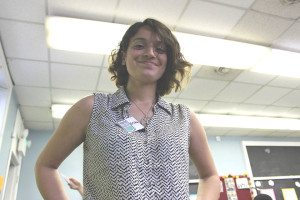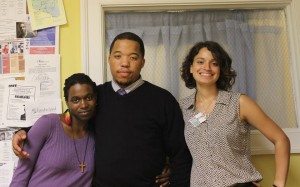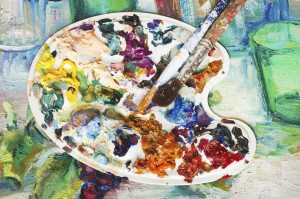“Hope is not a butterfly or a small bird, even though it soars through our minds… Hope is that small voice inside your head that keeps a person moving forward when life takes a turn for the worst. Hope is the light at the end of the tunnel, and the fire that burns behind all of our actions.”
These words come from a strong, tenacious pre-medical college student who has overcome many obstacles throughout her life. She is still not backing down on the pursuit of her dreams and using her experiences to change the world. From growing up homeless to having parents who were addicted to drugs, Johns Hopkins senior Erika Rodriguez has been dealt many hard cards. Erika provided RIZZARR with a portion of an essay she wrote called Gone for Good that depicts the life she overcame.
“The date was February 18, 2007… Suddenly, I was able to unearth this uncontrollable rage from the depth of my being; I jumped to my feet and propelled my mother off my fragile and malnourished body. Lunging towards my brother I grabbed him by the waist and flung him over my shoulder like a rag doll.
Lost and confused, I stopped by a nearby motel and checked in with my paycheck from earlier that day. As I held my little brother in my arms and rocked him to sleep, the hours blurred by, my throat tightened, the tears welled up in my eyes and they fell like a warm waterfall on my neck. Sidling past my somnolent brother, I rummaged through the duffle bag that lay untouched on the broken bed of the motel. While scouring for some trace of food in the bag, I came across a small pair of shoes, my brother’s baby shoes. At first, it made me realize the childhood that I was not able to experience; anger and hate surged through my veins, but just then, in the midst of my fury, I glanced at my brother, sound asleep. While he slept peacefully unaware of his surroundings, I saw the hope that laid in his future and that also lays in mine. We could now start anew…
Erika has never let her goal on obtaining a better life be shut down. She has vowed to become all that she can be and that includes becoming a doctor who can help other people not only medically, but also through the trials of life. Over the past few years, she has used her life experiences to help other homeless students in the Baltimore area and youth who are facing obstacles. She essentially has used her hardships and perserverance to be a testament of what is possible despite the obstacles.
RIZZARR INTERVIEW WITH ERIKA RODRIQUEZ

Rodriquez: “For many lower-class children, and those below the poverty line, education is their only viable opportunity for social mobility.” (Photo courtesy of Erika Rodriquez)
1. Tell us about your childhood.
Well, I grew up in pretty big family; I am one of 13 kids. My mother and my father had a divorce when I was about two years old, and my mother remarried another man. I grew up in various places in the Miami, Florida area. My father was born in Cuba and migrated over to the U.S.A, and my mother was a first-generation Cuban. Growing up, I had to speak Spanish all of the time and was only able to speak English at school.
My mother started using a lot of pills and then it escalated to stronger drugs, like cocaine, and that kind of destroyed a lot of the foundation of the marriage between my mother and my step-father. Eventually, they issued for a divorce.
After this, my brother, my mother and I bounced around a lot. There were times when we were sleeping on family and friend’s couches and even some shelters. My mother didn’t really have enough money to feed us. Luckily, our school offered free breakfast and lunch and if we were lucky, then we could get a $5 pizza at Little Caesars for dinner. But if we couldn’t get that, then we wouldn’t eat anything.
Our situation escalated when my mother started hanging around “the wrong kind of people.” I remember, when I was around thirteen, I came home and my mother was going through a withdrawal and she was quite upset. Things turned worse than they ever had been. My mother had always been abusive throughout my whole childhood, but that day it was more physical abuse than what I was used to. I was used to the slaps, cigar burns on my arms, but that day it was really bad. I just remember my little brother seeing everything and the look of terror on his face; so I decided it was better for us to leave. I promised him that I would take care of him.
2. What were some of the challenges that you faced growing up?
It was hard specifically in middle school because I was still living with my mother. I was sent to see the school psychiatrist because some teachers noticed bruises and were worried. I finally spoke out and admitted to the physical and emotional abuse at home and my case was reported to the police; this was the first time my brother and I were removed from my mother. Even though the school and officials had significant evidence to remove parental custody from my mother, we were sent back to her a week later.
Growing up my mother always preferred my little brother. My mother always told me that I was a mistake and that she never loved me. That was quite difficult to grasp as child; that my mother’s love was conditional. I was forced to grow up very quickly and had to help support my mother financially and emotionally; it was extremely draining.
When I started living with my grandmother, I was finally somewhere where I felt supported and cared for. I was finally able to have a relatively normal childhood. However, at that point, I felt like I couldn’t relate to other kids in my school. I felt disconnected. I felt as though I was different from everyone else and there was no way that anyone could understand. I intentionally ostracized myself and even my closest friends had no idea what my past consisted of or where I came from.
It’s still difficult; it’s a burden I deal with every day. For example, I absolutely dread “Parent’s Weekend” at my school. It’s so frustrating to see so many of my friends with their respective parents and seeing how happy they are. It’s even more upsetting when I see student’s here at Hopkins treat their parents with such loathing, hatred and ungratefulness. It’s truly disgusting. They have no idea how good they have it…
Just the other day, I was in a Miami courthouse clearing my public record because my mother used my name for a felony charge when I was fifteen; I only just found out about it. There’s nothing I can do I just have to take it one day at a time and rebuild myself. I am still dealing with the repercussions of what she did when I was a child but I have to keep moving forward.
3. Despite your challenges, how were you able to build up your inner strength and be so successful in school?
For many lower-class children, and those below the poverty line, education is their only viable opportunity for social mobility. Many of these youth are ill-educated, having never completed basic schooling and, as a result, are having difficulty procuring stable homes and employment—a situation to which I am familiar. When I was younger I felt that my destiny was already laid out for me and there was nothing that I could do to escape it. However, I got lucky and found teachers that really cared about my future and pushed me to succeed. Through education I was able to escape this cycle and create a future for myself. For me, education was my outlet, my hope. I never imagined that I would ever have the opportunity to go to a college let alone a prestigious university. Every day I remind myself how hard I’ve worked to get to where I am now. It doesn’t matter that I have to work three jobs, complete research all while being a full-time student; one day, it will all be worth it.
4. Talk about your success and how it makes you feel to have accomplished so much despite everything?
There are days when I feel proud of my accomplishments, but the thing is, I don’t want to get too proud. If I do, I think I will become complacent and be ok with slacking off. I never want to be too happy or too proud until I’ve gotten that degree(s). I will let myself appreciate small victories, but that doesn’t mean that the battle is won. Every day I push myself harder and expect more; but that tends to be the general Hopkins student mentality. That may be my current environment, or a personal approach, I don’t know, but until I have that degree in my hand, I won’t be completely happy. I have big goals that I want to accomplish and I will continue to push myself and I won’t be complacent until I’ve achieved those goals.

Rodriquez: “If I accomplish these two things then I will count my life as a success and worth living regardless of my past. I just want a place that I can call my home. That is how I feel at Hopkins.” (Image courtesy of Johns Hopkins University)
However, there are some days that I don’t want to get out of bed and I tell myself that “This isn’t fair”, “Why is it so hard for me?”, and I feel defeated. There are days where I can’t sleep at night; my mind gets out of control. It all feels so overwhelming some days and I just want to cry. I had a lot of anger issues growing up and I’ve tried to become calmer and more balanced person. I try to make time for myself to mediate at the Baltimore Shambalah, read a good book or just sit and listen/play some music to release all of that stress in some way. I’m trying to get myself together; I know where my faults lie. Just because I’m in a good place right now, that doesn’t mean there isn’t room for improvement.
5. How has helping homeless youth impacted your life and your thoughts on the situation improving?
The biggest impact my internship with the Youth Empowered Society has made in my personal life is being more honest with friends and loved ones. I’ve tried to become more open and accepting about my past. I always felt that it was a thing to be ashamed of but I’ve learned to embrace my past because it shaped me into the person I am today. Seeing all of the trials and tribulations that these youth are going through made me realize just how lucky I am and how much I’ve grown. By being honest with them about my past and showing them how similar it is to their present circumstances, hopefully it can show them that just because you’ve been dealt a bad hand, that doesn’t mean you automatically “lose”.

Erika works with others at Baltimore’s YES Drop-In Center to help and inspire homeless youth. She says it has changed her entire perspective on life. (Photo courtesy of YES Drop-In Center)
Lastly, during my internship with ‘YES Drop-In Center’, all of the staff had to participate in a trauma workshop. One of the skills that the facilitator addressed at the workshop was self-care, a skill I believe many people overlook. I hadn’t previously considered self-care to be a skill per se, however, after working many hours at ‘YES’ I have realized its value and significance. While at ‘YES’, I returned home every day feeling utterly hopeless for these youth because I felt that I wasn’t making a significant impact. I brought home with me all of that emotional baggage—the youth’s experiences on the streets, and the memories of my own.
Through the workshop, I learned how to separate my personal life and my work life. Granted, it is always important to form emotional and physical attachments to your work, but sometimes one needs to take a step back and assess the possible toll it may have on one’s overall health. After the workshop, I started to realize that I tend to exhaust myself across many aspects of my life. Working three jobs, completing medical research, and being a full-time student can be taxing to any individual; I never allowed myself to put down the textbooks and listen to music, take a walk, or read a book for pleasure. I’ve learned that I will never be able to help someone else unless I am able to tend to my physical and mental well-being first. Self-care is an essential skill that I hope to continually improve, so that I may increase my productivity and usefulness to others more in need.

Rodriquez:”Everybody is given a box of watercolors to paint a beautiful landscape… no matter what you have you can still make that beautiful picture one day. You can still make that great masterpiece, regardless of how long it takes for you to open that box.” (iStockphoto/ Thinkstock)
6. What are your goals?
My two biggest goals in life are to:
1) Enjoy going to work every single day. I want to love what I do and feel that I’m making some kind of difference every single day; no matter how minute it may be.
2) I want to own a home. It doesn’t matter what the size of it is. I just want to live in a secure place where I don’t feel like I have to worry about making the next mortgage or utility bill.
If I accomplish these two things then I will count my life as a success and worth living regardless of my past. I just want a place that I can call my home. That is how I feel at Hopkins. For the fist time, it feels like I’ve come home.
7. What advice would you give to anyone who is struggling as they are trying to accomplish their dreams?
I feel like there are two analogies that spoke to me when I was a kid which were told to me by two theater professors:
1) One day, my theater professor brought in a 12” ruler to class one day. He presented us the ruler and pointed it to the 12” mark and said, “This is ‘making it’. Some people are given three inches of this ruler and they are born with nothing and need to work really hard to get to the end. Some people are given nine inches of this ruler, but if you don’t work those extra three inches, you will never get to the end.” My professor was talking about making it in acting, but in my mind, I applied it to ‘making it in life’. Even if you have the perfect life, and the perfect family, but if you are not willing to push yourself and work, then you will never get to the end of that ruler. And yes, some people only get a couple of inches, and it will be harder, but you can still make it. As long as you put in hard work, you can accomplish anything. That always spoke to me; just because I was given “x” amount of inches, that doesn’t mean that I can’t make it to the full twelve if I work hard enough.
2) Everybody is given a box of watercolors to paint a beautiful landscape. Some people have all of the colors in the box from the beginning, and some people don’t. The people that don’t are going to have to learn how to mix blue and red to get purple for that setting sun. Some people will have both a thin and thick brush; some will not. If you only have a thin brush you are probably going to take forever to paint those sweeping landscapes. If you only have a thick brush you will have to be extra tedious to get those small details just right. Then again, for some people, it may take years for them to even open the box. But it doesn’t matter, because no matter what you have you can still make that beautiful picture one day. You can still make that great masterpiece, regardless of how long it takes for you to open that box. That is what it would tell people; just because you can’t open that box right away, or you don’t have the “certain color” that you need, that doesn’t mean you can’t paint a beautiful picture. You just have to be willing to try and to make the most of everything you’re given.








